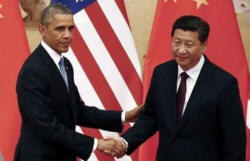|
 Souring
China business climate risks U.S. investment treaty talks Souring
China business climate risks U.S. investment treaty talks
 Send a link to a friend
Send a link to a friend
[June 08, 2015]
By Michael Martina and Matthew Miller
BEIJING (Reuters) - China and the United
States will swap initial demands for an investment treaty as early as
Monday, sources said, but U.S. investors are already worried that an
emerging raft of Chinese regulations could threaten the future of talks.
|
|
 In exchanging demands, the world's two largest economies will
outline industry sectors that each side deems to be closed to the
other side's investors. Such "negative lists" will define the scope
of the treaty and are already months overdue. In exchanging demands, the world's two largest economies will
outline industry sectors that each side deems to be closed to the
other side's investors. Such "negative lists" will define the scope
of the treaty and are already months overdue.
China has more restrictions on foreign investment than the United
States, and U.S. investors hope that a treaty will give them
increased access to China's many tightly controlled industries, from
financial services to healthcare.
But three sources familiar with the treaty talks say U.S.
negotiators expect Beijing to come up with an expansive "negative
list", noting that it has pursued in recent months new rules that
could further restrict foreign access to sensitive sectors.
"After 35 years of reform and opening in China, there are enough
data points out there to suggest we are now seeing a reversal," one
source said.
Beijing's commerce ministry could not be reached for comment but it
has said foreign investors enjoy ample opportunity in China. Beijing
has also complained of restrictions on Chinese investment in U.S.
infrastructure and technology, and says its firms are singled out in
U.S. national security reviews.

However, China is pursuing legislation, including rules on national
security and non-governmental organizations (NGOs), which are seen
as aggressive and overreaching by some within the foreign business
community.
For example, China's draft National Security Law and Anti-terrorism
Law, which could be adopted this year, call for the use of "secure
and controllable" technology developed in China or which uses source
code released to Chinese inspectors.
Another pending law on foreign NGOs, which includes myriad business
groups, would give police broad supervisory power over their
budgets, agendas and personnel decisions.
GROWING PESSIMISM
Those moves, along with fears that Chinese regulators are targeting
foreign firms in competition probes, have led to decades-high levels
of pessimism among foreign investors.
The American Chamber of Commerce in China wrote to the Chinese
government last week to complain about the security law.
[to top of second column] |

"It raises fundamental questions about whether future commitments by
China to open its markets to foreign investment will produce the
intended results," the chamber said in a letter seen by Reuters.
It said the draft law risked "undermining the ongoing BIT (Bilateral
Investment Treaty) negotiations".
Commercial relations have also been soured by allegations from
Washington that Chinese hackers have been behind recent attacks on
U.S. government agencies and American companies.
Last week, U.S. officials accused Chinese hackers of a breach of
government databases to steal files on four million federal
employees, the latest in a string of espionage charges leveled at
China. Officials in Beijing said the claims were unscientific and
irresponsible.
All of this will hang over high-level U.S.-China strategic and
economic talks in Washington in late June.
"This is the most difficult time I've seen in China for
multinationals – and I've been here close to 30 years," said James
McGregor, the chairman for U.S. public affairs consultancy APCO
Worldwide in China.
"I have clients asking me whether they will be welcome here much
longer," he said.
(Reporting by Michael Martina and Matthew Miller; Editing by Mark
Bendeich)
[© 2015 Thomson Reuters. All rights
reserved.] Copyright 2015 Reuters. All rights reserved. This material may not be published,
broadcast, rewritten or redistributed.

 |